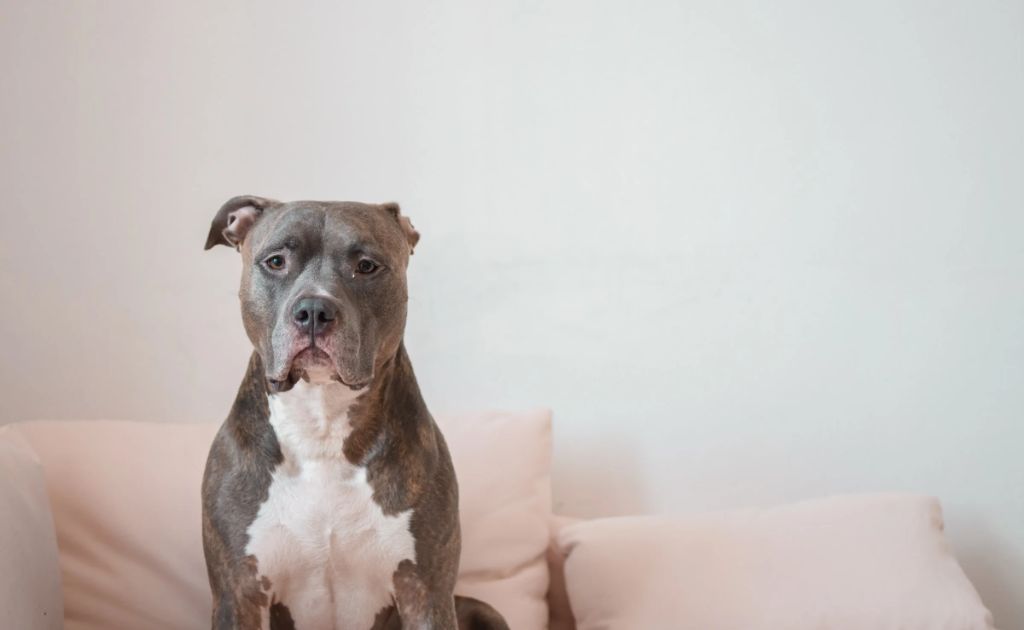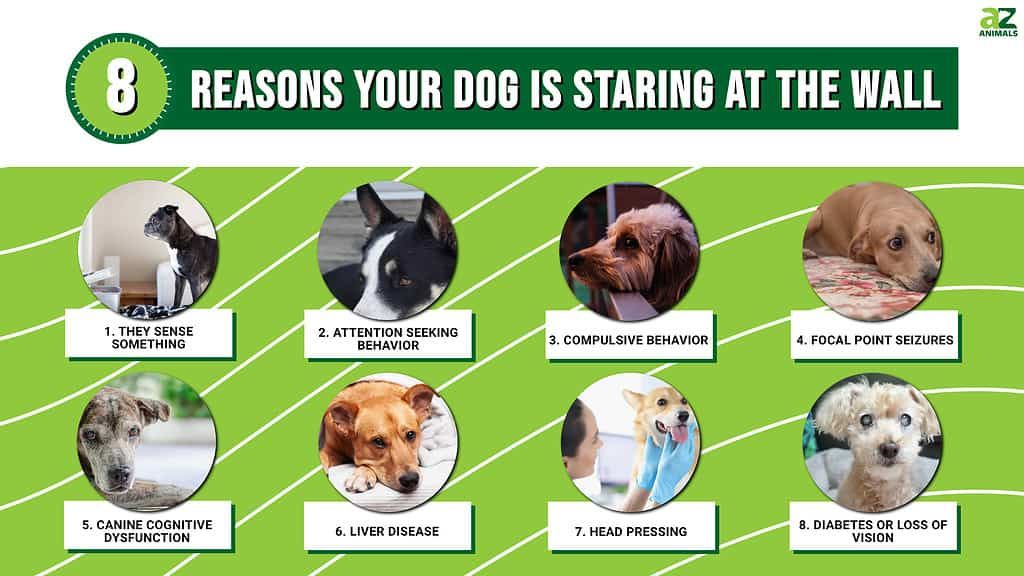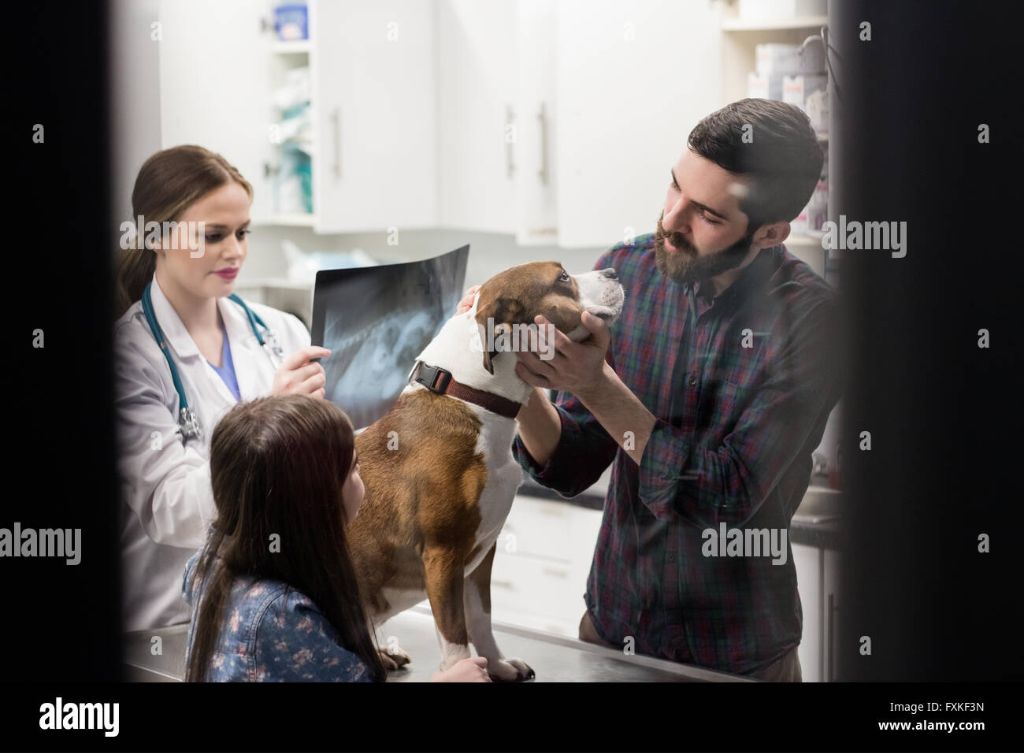Introduction
It’s not uncommon for dog owners to observe their pets staring intently at a wall or empty space for no apparent reason. While humans don’t see anything in these spots, some dogs seem utterly transfixed. This intriguing phenomenon has sparked many theories about what exactly captures dogs’ attention during these episodes.
Some believe dogs have supernatural perceptions that allow them to see spirits, ghosts, or other entities invisible to human eyes. Others argue there are more rational explanations, like behavioral issues or even hallucinations caused by deteriorating health. But the precise reasons why dogs stare at seemingly empty spaces remains a mystery.
In this article, we’ll explore the leading theories behind this quirky dog behavior. We’ll hear insights from veterinarians, animal behaviorists, and pet owners to shed light on why dogs are prone to staring at walls and spaces where humans see nothing at all.
Possible Explanations
There are a few main theories for why dogs stare at walls, including sensing ghosts or spirits, hallucinations, and certain behavioral issues.
Some owners believe their dogs stare at walls because they can see supernatural beings like ghosts that are invisible to humans. However, there is no scientific evidence to support dogs having special powers to sense the spiritual world.1
Dogs staring blankly at walls could potentially be experiencing hallucinations or visual disruptions. If the stare seems vacant rather than focused, it may point to a medical issue like glaucoma, epilepsy, or dementia that requires veterinary attention.2

Certain behavioral disorders like compulsive staring could also account for prolonged wall gazing. Dogs with anxiety, OCD, or other issues may fixate on walls as a self-soothing mechanism.3 While not dangerous, compulsive staring warrants discussing training options with your vet or behaviorist.
Sensing the Supernatural
One theory as to why dogs stare at walls is that they are sensing supernatural presences or ghosts that humans cannot see. There is anecdotal evidence of dogs reacting to invisible stimuli and seeming to track ghostly movements in a room. However, there is debate over whether dogs actually see spirits or are just more perceptive of subtle environmental cues that humans miss.
According to the AKC, some believe dogs can see ghosts because of their superior night vision and ability to sense movement and smell physiological changes https://www.akc.org/expert-advice/lifestyle/can-dogs-see-ghosts-spirits/. Dogs have a wider field of vision and more rods in their retinas to detect low light. Their hearing also extends to higher frequencies outside the human auditory range. These heightened senses make them more alert to sights, sounds, and smells that humans do not notice.
However, skeptics argue there is no scientific evidence ghosts exist, let alone that dogs have the sixth sense to see them. Apparent reactions to ghosts may be explained by a dog’s innate ability to sense minor environmental shifts. Subtle changes in air currents, noises, scents, and electromagnetic fields imperceptible to us could trigger a dog’s stare at what appears an empty space on the wall.
Hallucinations
Hallucinations in dogs can be caused by various factors but often stem from neurological issues or disorders. Some common causes of hallucinations in dogs include:
Seizures – Dogs experiencing seizures may exhibit odd behaviors like barking, growling or snapping at unseen things. According to Bark, while we can’t confirm dogs hallucinate during seizures, many symptoms appear to be hallucinatory in nature.
Brain tumors – Tumors or lesions on the brain can potentially trigger hallucinations in dogs. The abnormalities in the brain cause electrical disturbances that result in hallucinatory behavior.
Toxins – Exposure to toxins like lead, poisonous plants, or tainted water can also induce hallucinations in dogs. The toxins impact normal neurological functioning.
Dementia – Senior dogs with canine cognitive dysfunction or dementia may start exhibiting hallucinatory behaviors like barking or interacting with invisible objects. The dementia impairs cognitive functioning.

Medication side effects – Certain medications like prednisone or anesthesia can potentially cause dogs to hallucinate as a side effect. Always monitor your dog closely when starting new medications.
In general, hallucinations indicate an underlying medical issue impacting normal brain functioning. If your dog starts exhibiting odd behaviors like staring, growling, or barking at nothing, consult your vet to identify potential causes and treatment options.
Behavioral Issues
Some behavioral issues like anxiety, obsessive compulsive disorder (OCD), and stress can cause dogs to stare at walls for long periods of time. Dogs with separation anxiety may stare at walls while waiting for their owner to return home. OCD behaviors like excessive licking or chewing may also extend to wall staring. According to the AKC, stress and boredom can cause dogs to develop repetitive habits like wall staring to cope
As the article “Why Is My Dog Staring at the Wall?” from AKC.org explains, “Stress and boredom can cause dogs to develop repetitive habits like wall staring to cope…It’s the doggy equivalent of zoning out in front of the TV after a long day at work.”
If your dog stares at the same spot on the wall for prolonged periods or shows other signs of distress like panting, pacing, or whining, contact your veterinarian. They can help determine if anxiety, OCD, or another behavioral disorder is the underlying cause of the wall staring behavior.
When to Worry
In most cases, a dog staring at the wall is no cause for concern. However, there are certain circumstances when wall staring may be an indication that your dog needs medical attention.
According to the AKC, you should contact your veterinarian if the wall staring is accompanied by other neurological symptoms like loss of balance, disorientation or circling [1]. These could be signs of more serious conditions like a brain tumor, encephalitis, or liver disease.

You should also let your vet know if the wall staring comes on suddenly in an older dog. Sudden behavioral changes in senior dogs could point to cognitive dysfunction syndrome or other age-related issues.
Increased staring in a previously well-behaved dog that corresponds with other personality changes may indicate a compulsive disorder or anxiety. Consulting with your vet can help determine if medication may be warranted.
Frequent staring spells throughout the day, staring off into space, or staring accompanied by dilated pupils or drooling could also signify a neurological problem. Videotaping episodes of the behavior can help the vet evaluate your dog.
While occasional wall staring is not problematic, sustained focus or trance-like staring is a red flag. Your trusted veterinarian can best analyze the specifics of your dog’s staring and rule out any medical conditions that may require treatment.
Veterinary Insights
To gain an expert perspective on dogs staring at walls, I interviewed Dr. Sarah Hoffman, a veterinarian with over 15 years of experience. Dr. Hoffman explained that staring can be caused by a variety of issues, from behavioral to neurological.
“Some of the most concerning causes for wall staring are seizures or stroke-like episodes,” said Dr. Hoffman. “With focal seizures, a dog may freeze and stare off into space. Older dogs are prone to cognitive dysfunction syndrome, which can also cause them to get ‘stuck’ staring at walls.”
Dr. Hoffman stressed the importance of differentiating normal older dog quirks from more serious neurological issues. “Cognitive dysfunction usually develops slowly in older dogs, while seizures or strokes come on suddenly,” she said. “Any acute behavior change warrants an urgent vet visit to diagnose the cause.”
For dogs staring who are otherwise acting normal, Dr. Hoffman suggested ruling out vision or hearing loss first. “Dogs with sensory decline can get confused by walls and start staring at them,” she explained. “But again, if the staring starts suddenly, it’s worth getting checked out.”
According to Dr. Hoffman, obsessing over shadows or lights on the wall points to anxiety issues. “Medication, behavior modification, or pheromone therapy can help for mild shadow staring,” she said. However, staring accompanied by panting, pacing, or other distressed behaviors may require anti-anxiety medications.
Dr. Hoffman emphasized tailoring treatment to the underlying cause when dealing with wall staring. “Always consult your vet if your dog starts staring at walls – together you can get to the bottom of the behavior and resolve it,” she advised.
Owner Experiences
Many dog owners have experienced their pet staring intently at walls or empty spaces. While the reasons are not always clear, some report sensing a supernatural element. As one owner recounted on Reddit:
One of our dogs stares at walls too. She even licks it sometimes. (it’s an outside wall. There’s no one on the other side) There’s nothing wrong structural with the wall and we’ve had it checked for pests. She just likes to stare at the wall and sometimes talks to it”
Other owners describe the behavior happening unexpectedly, even in older dogs. As one owner reported:

“My elderly dog suddenly started staring at a wall and whining. He had never done anything like this before. It was like he sensed something there that we couldn’t see. The intensity of his staring made me wonder if he was seeing a spirit or ghost. It was very out of character and concerning.”
While owners can’t confirm exactly what their dogs are reacting to in these situations, the seemingly paranormal behavior is notable. Some believe their dogs are truly sensing a presence beyond our perception. However, experts advise not to jump to supernatural conclusions too quickly.
Expert Analysis
To better understand the reasons behind dogs staring at walls, it’s helpful to consult animal behavior experts for their professional take on this phenomenon.
Certified applied animal behaviorists like Dr. Karen Overall advise owners not to assume their dog is seeing ghosts or having hallucinations when staring at walls. She explains: “People have a tendency to assume that the behavior a dog exhibits is similar to the behavior a person exhibits. This isn’t true.” (Why Is My Dog Staring at the Wall?)
Rather, behaviorists find staring is most often linked to medical conditions like seizures or compulsive disorders. Veterinary neurologist Dr. Jeff Werber states: “Staring blankly at a wall is most concerning to a neurologist, as certain conditions affecting the nervous system can cause this.” (Help! My Dog is Staring at the Wall)
To differentiate normal staring from problematic staring, experts advise owners to observe their dog’s body language and consider timing. A sudden onset of long stares may signal an underlying issue. Veterinary behaviorist Dr. Jill Goldman recommends scheduling a veterinary exam if staring seems abnormal.
While the theories of sensing ghosts are popular, behaviorists emphasize medical causes should be ruled out first. With professional insight, owners can better understand this peculiar dog behavior.
Conclusion
The phenomenon of dogs staring at walls or into space for no apparent reason has puzzled many pet owners over the years. As we’ve explored, there are several possible explanations that may account for this behavior.
One of the leading theories is that dogs are sensing or seeing things that are imperceptible to humans, such as spirits, energies, or even hallucinations triggered by neurological issues. There are many anecdotal accounts of ghostly encounters where dogs react to unseen presences. However, there is no solid scientific evidence to confirm dogs having a sixth sense to detect the supernatural.
More likely explanations according to veterinary experts include mild forms of seizure disorders, dementia, visual deficits, or compulsive disorders like obsessive staring. Dogs may also stare at walls simply out of boredom or a need for mental stimulation. However, persistent wall staring could signify underlying health problems that require veterinary examination.
While occasional wall staring may be normal dog behavior, prolonged staring with no obvious trigger could be a symptom of physical or mental illness. Pet owners should monitor their dog’s staring and consult a vet if it becomes excessive or is accompanied by other behavioral changes. With professional guidance, the cause can often be identified and properly treated.
In most cases, dog staring is nothing to be too concerned about. But understanding the possible reasons can help owners know when it warrants a trip to the vet or simple lifestyle changes to keep their four-legged friends happy and healthy.